Skift Take
As the corporate travel recovery gathers steam in France, remote work, health and safety guidelines, and governmental restrictions will affect its trajectory. Travel, corporate card, and expense technology will lead the way for corporations to navigate these new, unfamiliar paths in 2022 and the years ahead.
This sponsored content was created in collaboration with a Skift partner.
The corporate travel, card, and expense landscape will evolve quickly in 2022 to meet the demands of a new operational environment. These changes will include adjusting for hybrid and remote work, developing and disseminating health and safety guidelines as Covid evolves, and reacting to the unpredictable ebbs and flows of governmental restrictions.
As business travel rebounds in France, travel and expense policies will lead the way as corporations navigate new, unfamiliar paths. Technology will drive companies’ ability to manage changes — and just as importantly, communicate those changes to enable employee compliance. Doing so will be critical in creating revenue opportunities through business travel and maximizing profitability through corporate cards and expense management.
French Businesses Expect a Strong Corporate Travel Rebound
Skift and TripActions conducted a survey of 376 business travelers and corporate travel decision makers (CTDMs) from France in December 2021. The results showed that travel is primed for a big return in 2022. For example, 75 percent of business travelers said that they expect to take three or more trips in 2022. Nearly one-third (31 percent) said they will take at least six business trips this year.
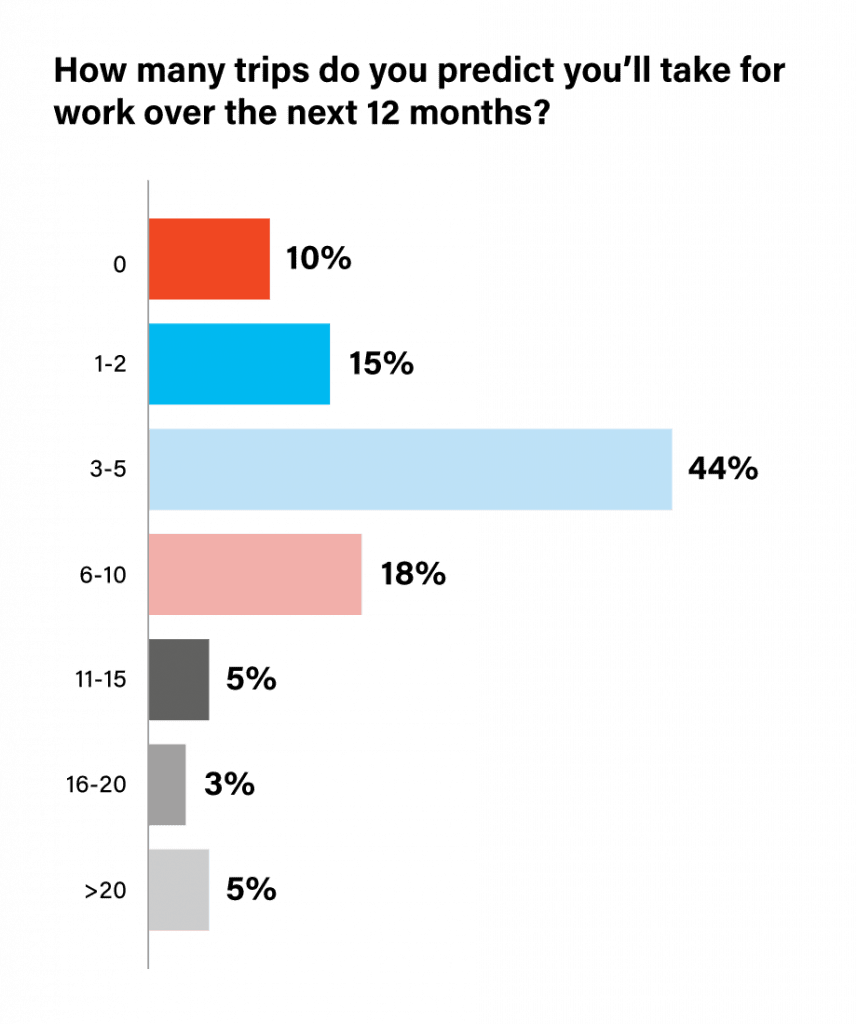
Underscoring the fact that corporate travel is a critical activity driving economic recovery, 84 percent of both travelers and CTDMs either “strongly” or “somewhat” agreed that business travel is important to driving their companies’ growth.
“Each time restrictive measures have been lifted, we have seen a surge in business travel bookings,” said Zahir Abdelouhab, vice president for SEMEA, TripActions. “I am confident we will see this once again — nothing replaces the value of face-to-face meetings, and we know from our customers that there is pent-up demand.”
While travelers and CTDMs agreed broadly about travel’s importance, their top reasons to take business trips differed. Business travelers in France said that they would most likely travel for essential client meetings, to close a deal, or to attend conferences and events, while CTDMs said they would prioritize travel that either establishes or fosters client relationships.
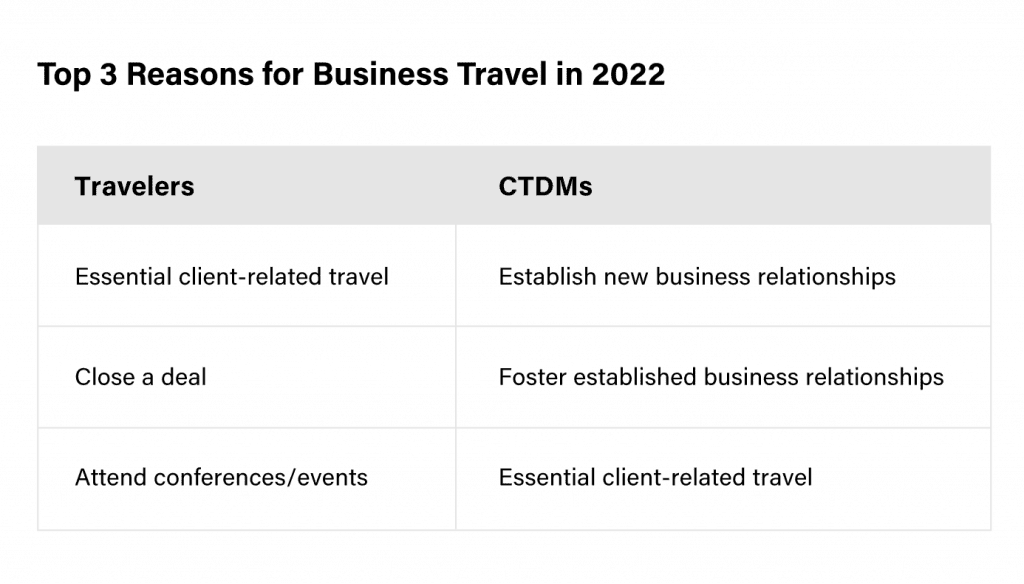
These slightly differing results suggest that if further lockdowns and border restrictions manifest, or if large in-person events continue to be scaled back or run virtually, travel managers may be more likely than travelers to pull back — especially if their definition of “essential” differs from that of their employees, or if they are more inclined to reduce potential liabilities.
Changing Policies Reflect Rapidly Changing Times
Recent operational changes have required reviews, and in some cases, substantial revisions, of corporate travel, card, and expense policies. Some of the updates are Covid-specific, related to health and safety guidelines or entry requirements at a destination. Others more broadly address emergent trends unearthed by the pandemic such as remote working protocols or how to handle last-minute bookings and cancellations. Those revisions are likely to have a lasting impact.
In France, exactly half (50 percent) of CTDMs said their companies have made temporary changes to their policies, and more than one-third (35 percent) said that they’ve made changes that will be permanent.
Communicating these policy changes will continue to be one of the biggest challenges in today’s travel environment. More than three-quarters (77 percent) of business travelers reported that timely information about travel procedures was their biggest concern when returning to work trips after the pandemic. CTDMs also reported this issue as their biggest concern, although just two-thirds (67 percent) said the same. Across the board, there were gaps between travelers and managers with respect to their concerns about safety, destination entry requirements, and updates about travel policies.
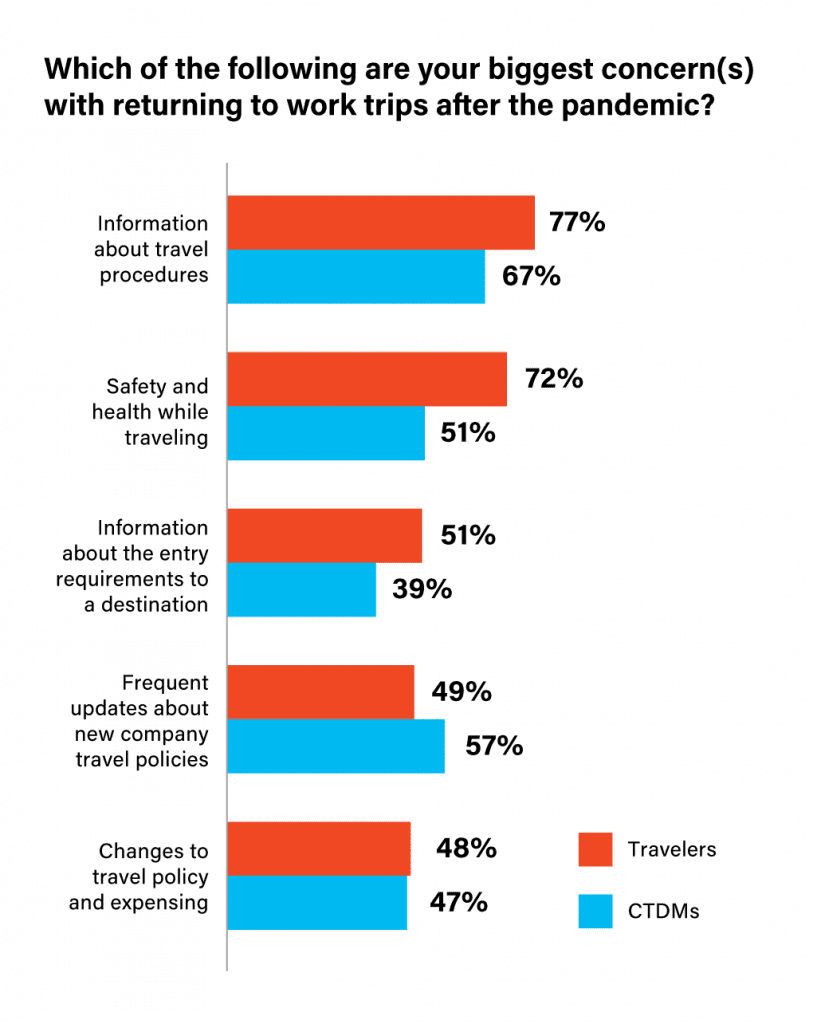
As any manager knows, the smallest deviations from policy can cause giant headaches. Disseminating information to ease these varied concerns is no simple task. Therefore, travelers and managers emphasize the need for technology to help fill the gaps and ease the transitions into new ways of working.
Technology Takes Travel and Expense Management Into the Next Era
Travelers and CTDMs both understand that the landscape will look different in 2022. And they both recognize that they will need enhancements to their travel and expense tools in order to make it work.
For example, the ability to process and manage employee expenses — a perpetual challenge among travel managers and finance departments — will only become more acute in 2022 as the purpose, frequency, cost, and need for flexibility for business travel evolves rapidly. Forty percent of CTDMs in France said that employees paying with personal expenses was a major concern. By comparison, a study from Skift and TripActions from earlier in 2021 found that 31 percent of CTDMs in Germany and 37 percent in the UK shared the same concern.
CTDMs in France also said that their employees were most likely to pay with a personal credit card — 43 percent compared to 36 percent in Germany and just 33 percent in the UK. Meanwhile, less than half of CTDMs in France (48 percent) said their employees paid with a company card, as compared to 60 percent in the UK and 54 percent in Germany.
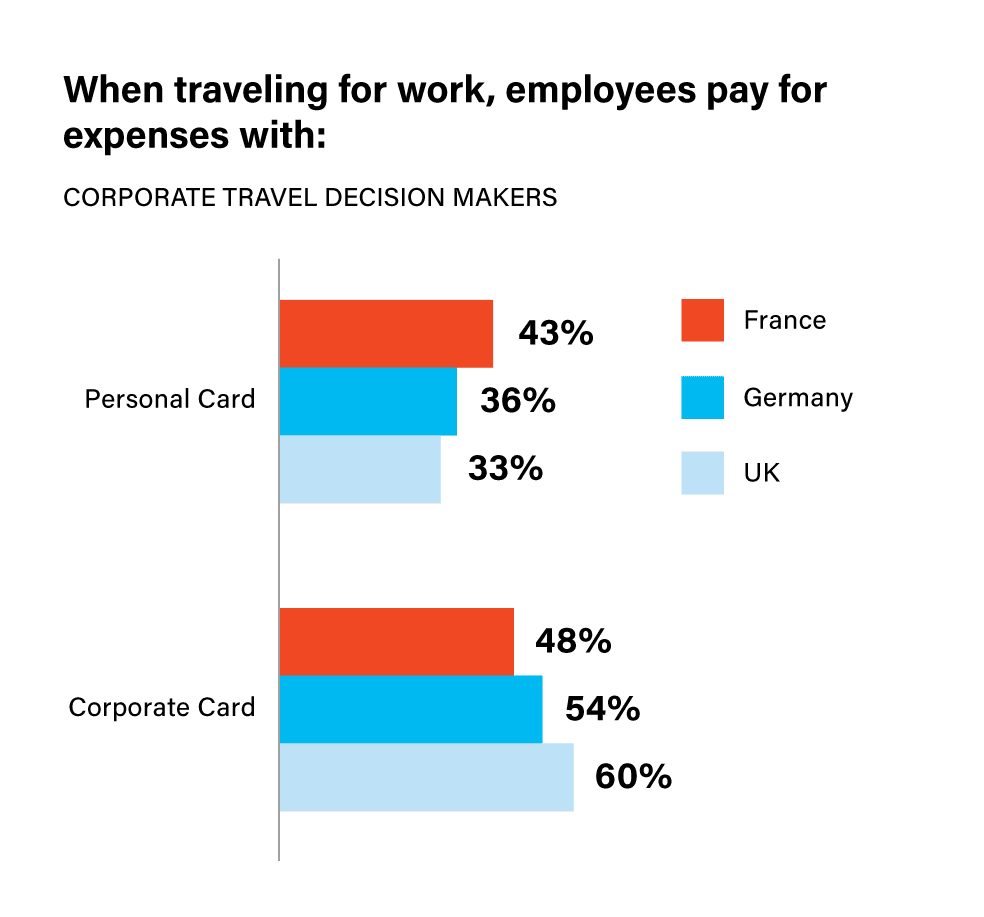
These sentiments have important implications for the tools that French businesses adopt for travel, corporate cards, and expense management, leading many to search for an upgrade. Among French business travelers, just 60 percent rated their current travel management platform between an “8” and “10,” and only 62 percent of CTDMs offered the same rating to theirs.
A majority of travelers (67 percent) and CTDMs (72 percent) either “strongly” or “somewhat” agreed that their company’s travel solutions support them well on a trip, make it easy to change plans, and provide quick response times when issues arise. However, the breakdown tells a richer story. Just 21 percent of travelers and 29 percent of CTDMs strongly agreed with that statement, meaning that even among those that reported satisfaction with their tools, there’s room for improvement.
“Companies have the challenge of bringing together disparate teams for collaboration, team building, and defining company culture whilst ensuring duty of care,” said Abdelouhab. “As the recovering economy creates pricing fluctuations, managing budgets and expenses will be harder without a fully integrated travel and expense management solution.”
Technology innovation didn’t take a break during the pandemic, and tools that allow bundling of travel, corporate cards, and expense management into one platform are becoming increasingly more sophisticated. To maintain high program adoption and success, it’s important for companies to choose a platform that offers at least an equal — if not superior — user experience, Abdelouhab said.
Furthermore, companies are looking at how bringing back business travel will impact their overall financial health, and many are looking for capabilities that allow them to weave policy into corporate cards and combine all expenses into one single view to support that process and provide full cost visibility.
In France, 69 percent of CTDMs indicated that they were interested in a travel solution that provides a more unified travel and spend platform, rather than separate solutions, in comparison to 66 percent of UK CTDMs and 62 percent of Germans.
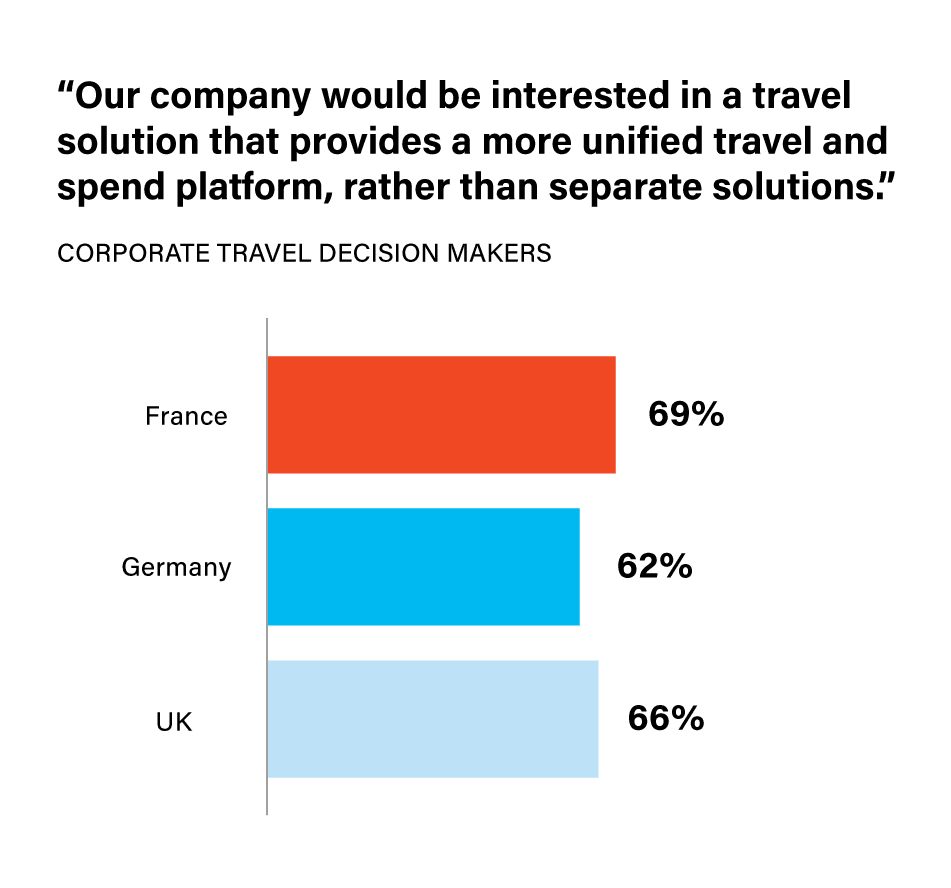
“Employees are interested in three things: A technology solution that brings together all their travel information and bookings in one place, an easy-to-use app, and the flexibility to make changes easily,” said Abdelouhab. “The benefit of a unified platform for travel managers and finance teams alleviates the complexity of managing a technology stack that can significantly burden processes, hinder productivity, and prevent teams from having global visibility into employee travel plans and company expenses.”
Technology has been the key for businesses to survive the pandemic, but it lacks the capability to foster the deeper human interaction that business travel enables. Moving into 2022 and beyond, companies have the opportunity to be more imaginative in bringing teams and customers together, and they can ease these transitions by automating travel, corporate card, and expense solutions.
To learn more about key corporate travel, card, and expense trends worldwide in 2022, please download the recent Skift and TripActions report.
This content was created collaboratively by TripActions and Skift’s branded content studio, SkiftX.
Have a confidential tip for Skift? Get in touch
Tags: business travel, business traveler, corporate travel, expense management, expense technology, france, SkiftX Showcase: Hospitality, tripactions

